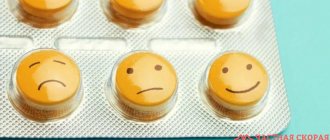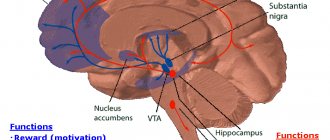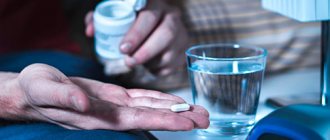Antidepressants are one of the most difficult groups of drugs for pharmaceutical consultation. Often associated with very specific disorders and sold strictly by prescription, they are shrouded in many secrets and speculation. Some patients are afraid of antidepressants, others have too high hopes for them. But both the former and the latter have many questions about how these medications will affect their lives. They ask these questions not only to the attending physician, but also to another person in a white coat - the head of the pharmacy. We have collected answers to the most popular of them in this material to help our readers, if necessary, build a capacious and correct consultation.
Explain in simple terms - how do antidepressants work?
Antidepressants are a group of psychotropic medications that affect the levels of neurotransmitters (they transmit nerve impulses between cells in the human brain), thereby helping to treat depression. We are talking about three hormones: serotonin, dopamine and norepinephrine. According to the prevailing point of view in scientific circles, with depression their concentration noticeably decreases, which is why the interaction between neurons is disrupted. Modern antidepressants help reverse this process, returning the brain to normal functioning. Thanks to this, patients experience the following improvements: improved mood, improved vitality, decreased anxiety and apathy, and normalized sleep and appetite.
How dangerous is taking antidepressants? What are the side effects?
Antidepressants cause some side effects. In drugs from different groups they are expressed to varying degrees. For example, SSRIs are the safest; most patients who take them do not experience any problems. At the same time, MAOIs can cause life-threatening side effects. They are incompatible with some types of medications and even food.
Unfortunately, the safest drugs are not always effective. In such cases, there is nothing left but to resort to “heavy artillery.” The doctor must carefully assess the patient's condition and prescribe the most appropriate medications in optimal dosages.
Sometimes in patients under 25 years of age, antidepressants increase suicidal tendencies, especially in the first weeks of use and when the dosage is changed. However, in the long term, they tend to improve mood and reduce the likelihood of suicide.
What happens if during treatment the patient stops taking the prescribed drug?
It all depends on the situation. If the withdrawal is abrupt, there is a high risk that the body will not have time to adapt to the new regime, and the side effects will increase exponentially. This is called withdrawal syndrome and can be expressed in different ways. Most often, patients complain of dizziness, headaches, sleep disorders, spasms and tremors in the limbs. There is also a rebound syndrome, in which untimely withdrawal from the drug provokes the return of all the negative symptoms of depression. With gradual withdrawal, such consequences do not occur, so it is extremely important to adhere to the dosage regimen prescribed by the doctor.
Content:
- Use of antidepressants.
- Impact on a person.
- Side effects.
- Withdrawal syndrome.
- Treatment.
Many people believe that antidepressants cause addiction, mistaking it for the withdrawal syndrome that can occur if therapy is abruptly stopped. If you take the medicine correctly and under the supervision of a doctor, then there will be no negative manifestations.
Are antidepressants dangerous for the body?
As with any medicine, side effects may occur when taking antidepressants. Most often we are talking about drowsiness (and sometimes, on the contrary, insomnia), inhibition of reactions, hypotension. However, given that on the other side of the scale are often the patient’s thoughts about leaving life or causing other harm to himself, this is not regarded as a serious obstacle.
Some antidepressants are contraindicated for heart diseases (arrhythmia, conduction disorders in the myocardium), but there are drugs that are allowed to be taken even by people who have had a heart attack. A number of such drugs cannot be prescribed for pathologies of the kidneys and liver. Knowing the patient’s health characteristics, the doctor selects the most suitable option for him. Therefore, antidepressants can only pose a danger when self-medicated.
What types of antidepressants are there?
Antidepressants are a heterogeneous group of drugs.
There are several types of them: Selective serotonin reuptake inhibitors (SSRIs) . In some ways, this is the most popular type of antidepressant. It is with them that treatment is most often started, since they cause the least side effects and are most safe in high doses. This group includes drugs: paroxetine, fluoxetine, sertraline, escitalopram, citalopram.
Serotonin and norepinephrine reuptake inhibitors : venlafaxine, duloxetine, levomilnacipran, desvenlafaxine.
Tricyclic antidepressants . They are usually prescribed after other drugs have been tried and failed because they have significant side effects. This group includes: amitriptyline, imipramine, nortriptyline, desipramine, doxepin.
Monoamine oxidase inhibitors (MAOIs) have potentially dangerous side effects, so they are also used as backup drugs. This group includes: nialamide, iproniazid, isocarboxazid, tranylcypromine, phenelzine.
Atypical antidepressants include drugs that are not included in other groups: mirtazapine, trazodone, vilazodone, viortoxetine, bupropion.
These drugs are available with a prescription and can only be taken as directed by a doctor. Not all antidepressants work equally well in different patients. It is important to choose a drug or combination of drugs that will be effective in a particular case.
Is it true that once started, depression medications will have to be taken for the rest of your life?
Treatment with antidepressants is not a quick process, and its duration largely depends on the severity of the person’s condition. Typically, the course of taking these drugs lasts at least six months. If no improvement is observed after six months, the doctor may extend the course or change the drug. Therefore, you need to be prepared for the fact that you will have to take antidepressants for quite a long time. However, there is no talk of lifelong treatment: the patient will either begin to recover, and the need for antidepressants will gradually disappear, or will demonstrate resistance to them, and the doctor will choose a different strategy. There is also a WHO recommendation that antidepressants should be taken for at least another 9 months after the symptoms of depression have disappeared.
How do you know which antidepressant is best to start with?
Initially, the doctor prescribes the drug that, in his opinion, is best suited for a particular patient. It is impossible to know for sure what will work more effectively, but there are some factors that you can focus on: the type and symptoms of depression, side effects of medications, the general health of the patient, and concomitant diseases.
If you have family members with depression and certain medications work well for them, chances are the same medications will work for you.
Antidepressants can be prescribed during pregnancy and breastfeeding, but with caution. The doctor must carefully weigh the possible risks.
Does taking antidepressants guarantee a complete cure for depression?
Unfortunately no. Often, the causes of depressive disorders lie not in physiology, but in human psychology, so drug therapy has only a temporary effect, which gradually fades away after discontinuation of the drug. Knowing this, doctors usually use antidepressants as part of a comprehensive treatment that also includes psychotherapy sessions. However, some patients only need medication to recover. On the contrary, they don’t help some people. Depression is a very complex disorder, so doctors select their own treatment methods for each specific case.
What to do if antidepressants don't help?
First of all, don’t panic. For some patients, antidepressants begin to help literally from the first days, but this is not always the case. In most cases, improvement occurs after weeks. An antidepressant is not a headache pill that works immediately after taking it. It is important to take them regularly, in the doses prescribed by your doctor.
Medicines may cause some side effects at first. For example, people who have just started taking SSRIs may experience headaches, nausea, dry mouth, and bowel dysfunction. After a period of adaptation, these symptoms disappear.
If the side effects are very strong, persist for too long, if you have been taking the drug for several weeks, but do not feel any improvement, you should not engage in amateur activities, consult your doctor.
Do antidepressants affect your sex life?
Strong antidepressants may indeed not have a very good effect on this delicate area of life in both men and women. Among the side effects of some tricyclic drugs is priapism - a prolonged painful erection not associated with sexual desire. More modern medications (MAO inhibitors) in some cases lead to anorgasmia and decreased sexual desire. This effect of antidepressants is considered a side effect, does not occur in everyone and disappears when the drug is discontinued and treatment is adjusted. Therefore, any sexual disorders that occur should be reported to your doctor immediately.
Are antidepressants compatible with alcohol?
During drug treatment of depression, alcohol consumption should be avoided. At the same time, different groups of antidepressants interact with alcohol in different ways. Mixing some (for example, tricyclic antidepressants) with alcohol can lead to serious consequences, including death. More modern drugs are not so dangerous in this regard. But MAO inhibitors, for example, can affect vasoconstriction (and therefore, indirectly, on erection), and can also enhance the effect of strong drinks and provoke, for example, damage to the liver or nervous system. Exactly how the drug interacts with alcohol is always written in the instructions. And in most cases this interaction is undesirable.
Sources
- Lacasse JR, Leo J. Serotonin and depression: a disconnect between the advertisements and the scientific literature // Florida State University College of Social Work, Tallahassee, Florida, United States of America PLoS Med. - 2005. - T. 2, No. 12.
- Rosenbaum JF, Fava M, Hoog SL, et al. Selective serotonin reuptake inhibitor discontinuation syndrome: a randomized clinical trial. Biol Psychiatry 1998 // https://www.uptodate.com/contents/discontinuing-antidepressant-medications-in-adults/abstract/17
- Haddad PM Antidepressant discontinuation syndromes // Drug Safety journal. - 2001. - Vol. 24, no. 3. - P. 183-197. - PMID 11347722.
- American Psychiatric Association. The Truth About Antidepressants // https://www.psychiatry.org/news-room/apa-blogs/apa-blog/2016/03/the-truth-about-antidepressants
- Tarasenko O. A. Side effects of antidepressants // Pharmacist. - 2003. - No. 14. https://www.provisor.com.ua/archive/2003/N14/art_33.php
- WHO Mental Health Program // https://www.who.int/mental_health/mhgap/evidence/depression/q2/ru/
- F Hieronymus et al., Efficacy of selective serotonin reuptake inhibitors in the absence of side effects: a mega-analysis of citalopram and paroxetine in adult depression // Molecular Psychiatry, 2017; doi:10.1038/mp.2017.147
- Rafael Gafoor. Antidepressant utilization and incidence of weight gain during 10 years' follow-up: population-based cohort study // BMJ 2018; 361 https://www.bmj.com/content/361/bmj.K1951
- Megan Brooks. Antidepressants Worsen Sexual Dysfunction and Depression? https://www.medscape.com/viewarticle/870660
- Kucher E. O., Shevchuk M. K., Sivak K. V. Experimental study of the influence of alcohol on the biological effects of antidepressants // Bulletin of St. Petersburg University. – 2010. – Series 11, issue 1. https://vestnik.spbu.ru/pdf10/s11/s11v1_10_S.pdf









